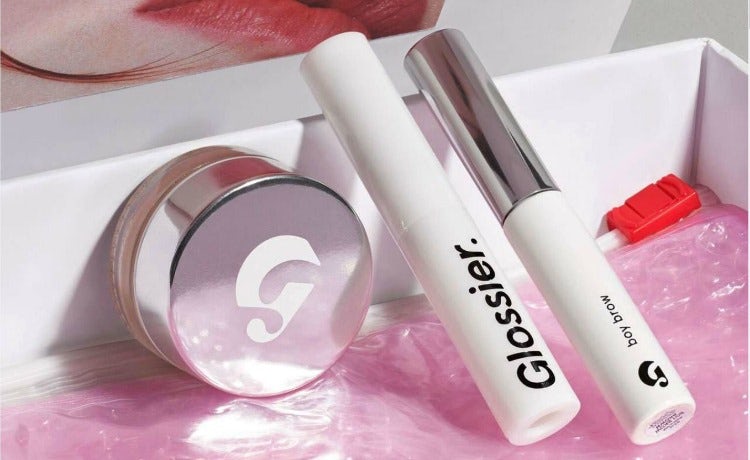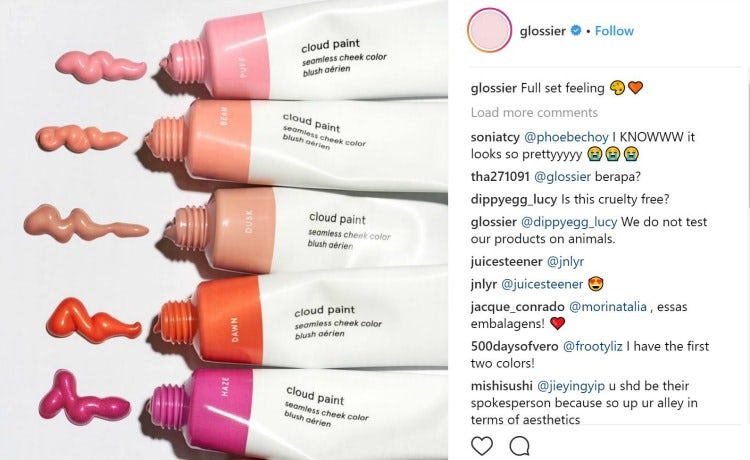Why direct-to-consumer beauty brand Glossier is ripping up the marketing playbook
Since launching online in 2014, Glossier has attracted a legion of hardcore fans with its straight-talking approach to beauty that shuns “stale retail” in favour of complete customer centricity.

US beauty brand Glossier doesn’t “go by the rules”, according to president and chief operating officer Henry Davis.
Inspired by the explosion of direct-to-consumer brands such as glasses business Warby Parker, and shaving subscription players Harry’s and Dollar Shave Club, Davis said he became obsessed with how to use digital for creative purposes to engage people at scale and ultimately change what it means to be a customer.
Over the past four years Glossier has carved out a niche in the billion-dollar global beauty market with an ecommerce operation selling its range of 26 skincare and make-up products, a content arm and retail stores in key locations across the US.
After analysing the dynamic between beauty brands and retailers, Davis believes existing relationships have resulted in brands lacking a tangible understanding of who their customer really is.
“We’re increasingly seeing the decline of department stores, which is suddenly making everyone wake up and think ‘I need to know my customer’,” he stated, speaking at Cannes Lions last week.
“But now you’re hamstrung because you’re reliant on this cash and every time you, as a consumer packaged goods CEO, say ‘we should go direct-to-consumer ecommerce’, the CEOs of the big department stores or supermarkets call you and say ‘look we’d really rather you didn’t because we need your customer coming to our shop’. There’s this symbiosis as if they’re both stood there with guns against each other’s heads.”
Positioning itself as the antithesis of the beauty industry’s big beasts, Davis explained that Glossier is “very upfront” about its strategy and its firm belief that owning the relationship with the customer is the only way to build a brand.

The company is considered innovative, said Davis, because it owns the bottom part of the sales funnel as it does not rely on any other players to make the sale on its behalf. Furthermore, the beauty brand is considered “extra innovative” because it can tap into the awareness part of the funnel via its content arm.
Not content with its penetration in these elements of the sales journey, Glossier is significantly investing time and money in working out how to own more of the funnel higher up and in particular how to “disintermediate social media”.
“Social media right now owns the relationship with the consumer and we’ve been able to use that to get to the customer in better ways than we could have done a few years ago, but now how do we take that one step further?” Davis asked.
“At the moment YouTube or Instagram or Facebook owns the context, the environment and the format in which we talk with our own customer and actually, if we really believe that having customers as a core part of the company is the way to build brands of the future, you have to start to own that relationship.”
READ MORE: Beauty influencers deliver ROI of £8.81, report finds
Instagram thinking
Engagement fuels every aspect of the brand and with the launch of each product Glossier wants to illicit a response. The brand has already amassed more than 1.2 million followers on Instagram and the team tests the development of each product by asking themselves ‘if this were an Instagram post, what would the comments be?’
The brand launched its Milky Jelly Cleanser after realising that customers never included a cleanser in their ‘my top shelfies’ post, which is where followers share with the Glossier community what’s in their bathroom cupboard.

Sensing that customers did not have an affinity with the products already on the market, Glossier did research asking its followers who would play a cleanser in a film. Emma Stone and Eddie Redmayne won by a landslide, both actors with pale milky skin, insights which inspired the formulation and design of the product.
Glossier then spent 18 months creating its first mascara because it wanted the formulation to be perfect. Shunning the trend of fast-fashion beauty products, Davis explains that taking 18 months to get the product “perfect” was actually a better business decision and was enabled by the fact the team were not constrained by the demands of a retailer.
When your friend says, ‘you have to try this thing’, you listen. You cannot buy that much goodwill with all the advertising and the best creatives in the world.
Henry Davis, Glossier
“We can launch it whenever we want and in whatever way we want. That’s what digital does for your ability to be creative,” he said.
“You take away all these constraints, you can say ‘forget why things are the way they are today,’ what is best for the customer? And making decisions based on that is such a liberating place to create from.”
Rather than working with influencers, Glossier has had much more success engaging its hardcore base of fans. For its most successful launch to date the brand deliberately did not send any product to influencers, instead gifting it to 500 superfans who had previously bought the most products or were the most engaged.
“Customer is at the heart of product development, customer is at the heart of strategy and customer is at the heart of the sale,” he explained.
“When your friend says, ‘you have to try this thing’, you listen. You cannot buy that much goodwill with all the advertising and the best creatives in the world. That’s what we’re focused on.”
From an advertising perspective, Davis insisted that Glossier is comfortable doing “random things that make people happy”, using its adverts as conversation starters rather than purely to drive sales.
The same is true of the company’s approach to offline retail. A third of Glossier’s LA store is given over to a “canyon room”, a room made to look like the canyons outside the city.
“There’s a weird soundtrack playing and it makes people happy,” said Davis. “It makes their day. It makes Glossier a place they want to come and engage with and by not trying to sell things you end up selling things, because people relate to you and feel part of what you’re doing. They want to take away that memory.”
Ripping up the rules
With every aspect of marketing Glossier was determined to rip up the rule book, starting with hiring a head of marketing who had previously only worked in finance.
Davis explained feeling like they had interviewed “every VP of marketing in New York”, but all of them came with a “playbook”.
“What I loved about our current head of marketing is she said: ‘I’ve never done this before and I don’t have a playbook, but I have 10 questions for you’. That was like magic,” he recalled.
“It was like how we want to engage with customers and also this means we don’t have to go by the rules, because the rules at the time we launched were ‘build a huge Facebook following’. And we were like ‘no we think Instagram is much more interesting’, because that’s where our customers were trending towards. Having the freedom to do that was really important.”
Davis argued that while he did believe that people trained in marketing can have the freedom to act in different ways, they need to be empowered to do so by their CEOs or company presidents encouraging them to forget what came before.
“They need to say: ‘I don’t mind if we have a bad quarter, what we need to do is build for three years out’. Legacy channels and ways of communicating with customers will decline and the brands that survive will be the ones that are prepared to cannibalise themselves by doing things differently quicker,” he concluded.
“What’s great about being a new company is we don’t have to cannibalise ourselves, we can just start afresh. But the brands that exist, these massive brands that don’t adapt will go down with that sinking ship of tired, stale retail. If they don’t adapt quickly we will see many brands that we grew up with just die and if that happens it’s sort of good riddance, because they’re not relevant anymore.”
Read all of Marketing Week’s Cannes Lions 2018 coverage, sponsored by MiQ, here.







